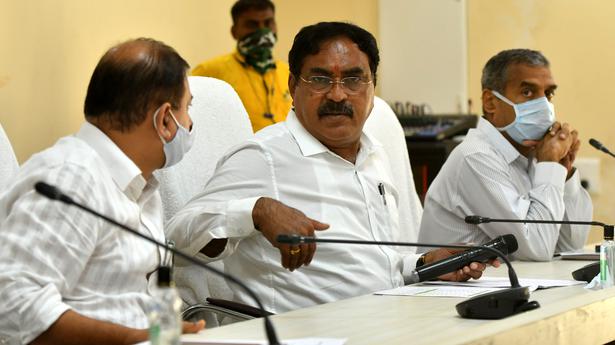
No GP bills pending with State govt., Errabelli tells sarpanches
The Hindu
‘Material component funds under NREGS due from Centre’
There are no pending bills pertaining to gram panchayats (GPs) lying with the Panchayat Raj and Rural Development Department as the State government has cleared almost all bills due from its side, Minister for PR and RD Errabelli Dayakar Rao told the representatives of sarpanches who called on him here on Thursday.
A delegation of sarpanches led by Sarpanches Association president Gudur Laxminarasimha Reddy, general secretary Palakonda Praneel Chander, Telangana State Sarpanches Welfare Association president S. Bhumanna Yadav and others met the Minister at the latter’s residence here and requested him to clear all pending bills to gram panchayats.
In response, the Minister explained to the delegation along with proof (release orders) and stated that there are no pending bills due from the State government to gram panchayats as all funds and grants had almost been released. He assured the sarpanches that remaining dues, if any, too would be cleared.
The Minister stated that there are dues of ₹1,140 crore funds pertaining to the material component under the Mahatma Gandhi National Rural Employment Guarantee Scheme (MGNREGS) from the Centre and they would be passed on to the gram panchayats as and when they were received by the State.
On the funds released by the State Government, Mr. Dayakar Rao explained that ₹760 crore bills pertaining to Gram Panchayat roads and another ₹166 crore funds were released under different heads. The dues pertaining to the cement-concrete (CC) roads would be released as and when the Centre releases them.
Hailing to role of sarpanches in the development of villages, the Minister complimented them for making Palle Pragathi programme a huge success. He assured them that he would take up the matter of providing life insurance cover to sarpanches with Chief Minister and that he would convene an extensive meeting of sarpanches after the completion of the current phase of Palle Pragathi programme.

“Writing, in general, is a very solitary process,” says Yauvanika Chopra, Associate Director at The New India Foundation (NIF), which, earlier this year, announced the 12th edition of its NIF Book Fellowships for research and scholarship about Indian history after Independence. While authors, in general, are built for it, it can still get very lonely, says Chopra, pointing out that the fellowship’s community support is as valuable as the monetary benefits it offers. “There is a solid community of NIF fellows, trustees, language experts, jury members, all of whom are incredibly competent,” she says. “They really help make authors feel supported from manuscript to publication, so you never feel like you’re struggling through isolation.”

Several principals of government and private schools in Delhi on Tuesday said the Directorate of Education (DoE) circular from a day earlier, directing schools to conduct classes in ‘hybrid’ mode, had caused confusion regarding day-to-day operations as they did not know how many students would return to school from Wednesday and how would teachers instruct in two modes — online and in person — at once. The DoE circular on Monday had also stated that the option to “exercise online mode of education, wherever available, shall vest with the students and their guardians”. Several schoolteachers also expressed confusion regarding the DoE order. A government schoolteacher said he was unsure of how to cope with the resumption of physical classes, given that the order directing government offices to ensure that 50% of the employees work from home is still in place. On Monday, the Commission for Air Quality Management in the National Capital Region and Adjoining Areas (CAQM) had, on the orders of the Supreme Court, directed schools in Delhi-NCR to shift classes to the hybrid mode, following which the DoE had issued the circular. The court had urged the Centre’s pollution watchdog to consider restarting physical classes due to many students missing out on the mid-day meals and lacking the necessary means to attend classes online. The CAQM had, on November 20, asked schools in Delhi-NCR to shift to the online mode of teaching.









